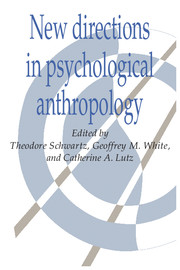Book contents
- Frontmatter
- Contents
- List of contributors
- Introduction
- I Cognition and social selves
- 1 Ethnopsychology
- 2 Cognitive anthropology
- 3 Schemes for schemata
- 4 The woman who climbed up the house: some limitations of schema theory
- II Learning to be human
- III The body's person
- IV Psychiatry and its contexts
- V Psychoanalytic approaches
- VI Disciplinary perspectives
- Index
1 - Ethnopsychology
Published online by Cambridge University Press: 05 June 2012
- Frontmatter
- Contents
- List of contributors
- Introduction
- I Cognition and social selves
- 1 Ethnopsychology
- 2 Cognitive anthropology
- 3 Schemes for schemata
- 4 The woman who climbed up the house: some limitations of schema theory
- II Learning to be human
- III The body's person
- IV Psychiatry and its contexts
- V Psychoanalytic approaches
- VI Disciplinary perspectives
- Index
Summary
In his article “The Self and Its Behavioral Environment” A. I. Hallowell writing in 1954 observed that aspects of self-awareness were at that time generally excluded from theorizing about the basic constituents of culture. Those who compiled inventories or lists of pan-cultural constructs might include reference to concepts of “soul” but rarely mentioned reflexive elements of experience, of the “self.” Hallowell did, however, note stirrings of interest in this area, and commented approvingly that,
now, in contrast with earlier editions, the Outline of Cultural Materials includes an item called “Ethnopsychology” under which we find “concepts of self, of human nature, of motivation, of personality,” so that, in the future, we should have more detailed inquiries into such topics.
(1967: 79)On the one hand, the recent rise of interest in “ethnopsychology” makes Hallowell's speculations seem prophetic (see Levy 1973; Lutz 1988; M. Rosaldo 1980; Straus 1977; Wellenkamp 1988; and White and Kirkpatrick 1985 for examples of work that fit loosely under this rubric). But, on the other hand, increased attention to ethnopsychologies, to indigenous modes of constituting persons, selves and experience, has raised a host of complications not foreseen in Hallowell's optimistic assessment. In particular, ethnopsychological investigations are producing a critique of taken-for-granted assumptions about the domain of the “psychological.” In this chapter I discuss this critique in relation to two constructs that lie at the heartland of the psychological: emotion and personality.
- Type
- Chapter
- Information
- New Directions in Psychological Anthropology , pp. 21 - 46Publisher: Cambridge University PressPrint publication year: 1993
- 5
- Cited by



